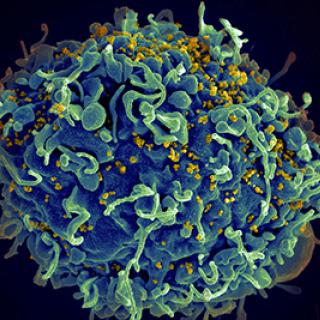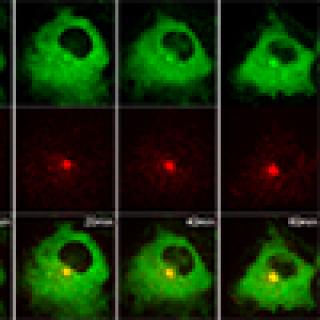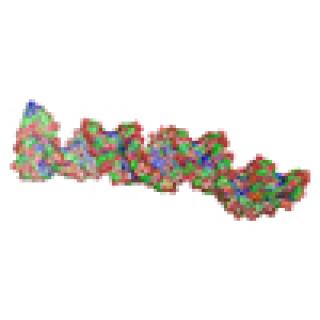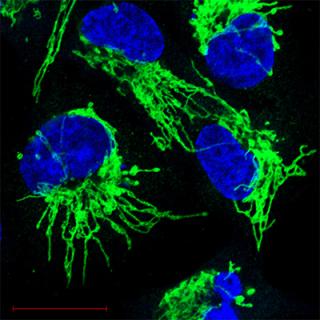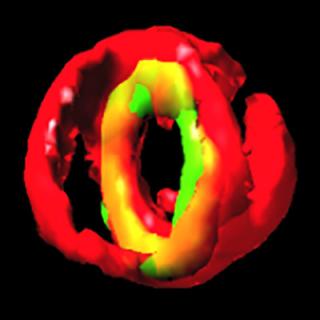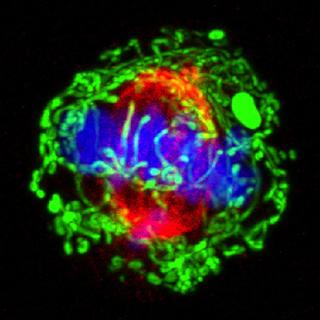Our Discoveries
Gene-regulating microRNAs gain control over hundreds of new genes with common sequence modification
MicroRNAs have an enormous influence over what happens inside cells. By blocking the activity of specific sets of genes, they help control virtually every known biological pathway and process. Disruptions in microRNAs have been linked to many diseases, and understanding how these molecules function, which genes they control and how they themselves are regulated are high priorities in cancer research.
Read MoreGastrointestinal tumors harbor T cells that recognize patients’ unique tumor antigens
CCR scientists, led by Steven A. Rosenberg, M.D., Ph.D., have determined that many common gastrointestinal tumors bear mutations capable of eliciting an immune response, suggesting that immunotherapy could be an effective way to treat these common cancers.
Read MoreResearch shows long noncoding RNA influences expression of key HIV receptor
New research from the Center for Cancer Research has identified a long noncoding RNA that influences the expression of CCR5, a receptor that HIV uses to infect immune cells. The finding points to the molecule as a potential marker that indicates a patient’s susceptibility to the virus.
Read MoreAkt protein kinase pathway regulates key step in the initiation of cilia formation
CCR investigators have discovered that activating the Akt protein kinase pathway stabilizes the binding of the WDR44 protein to the Rab11 protein. This prevents Rab11 from binding to the Rabin8 protein, thereby blocking cilia formation. When Akt is inactive, though, Rab11 instead is bound by FIP3, enhancing its binding to Rabin8, which helps initiate cilia formation. Since abnormalities in cilia formation are associated with a number of types of cancer, these findings point to several potential targets for cancer therapy.
Read MoreBacterial compound targets cancer-promoting RNA
Screening more than 3,000 natural products identified a compound that stops the growth of cancer cells by targeting a growth-promoting microRNA.
Read MoreProtein mutations lead to human disease by altering a cancer-promoting pathway
Working in collaboration with a team of other scientists, CCR researchers identified the role that the LZTR1 protein plays in disrupting the RAS pathway. It interferes with signaling, largely by dysregulating ubiquitination, a process defined as the attachment of a small protein called ubiquitin to a protein that is degraded by an enzyme.
Read MoreNew therapies tested in mice provide a one-two punch for treating liver cancer
Biopharmaceutical agents that combine the precision of cancer-specific antibodies and the potency of drugs toxic to harmful cells are increasingly being used to treat cancer. A team in CCR has identified two such agents for liver cancer, which were both found to reduce tumor size and prolong survival in mice.
Read MoreStudy reveals function of protein crucial to survival of Staph infections
A team led by Kumaran Ramamurthi, Ph.D.,Senior Investigator in the Laboratory of Molecular Biology, has identified why the GpsB protein is essential for the survival of Staphylococcus aureus, a leading source of infection in cancer patients in hospital settings. These findings, published in eLife, point to GpsB as a possible antibiotic target.
Read MoreStudy reveals regions where harmful DNA breaks are most likely to occur
Center for Cancer Research investigators have discovered that double-strand DNA breaks—the most dangerous form of DNA damage, which can lead to cancer—tend to occur during DNA replication at regions known as poly(dA:dT) tracts. Their findings represent a first step toward investigating ways to prevent these harmful DNA breaks.
Read MoreCommitting to cell division may be clue to cancer cell growth
In a new study in Nature, CCR researchers describe, for the first time, how a cell commits to dividing during the cell cycle. Since cancer cells divide when they should not, targeting this pathway might stop their inappropriate growth.
Read More

